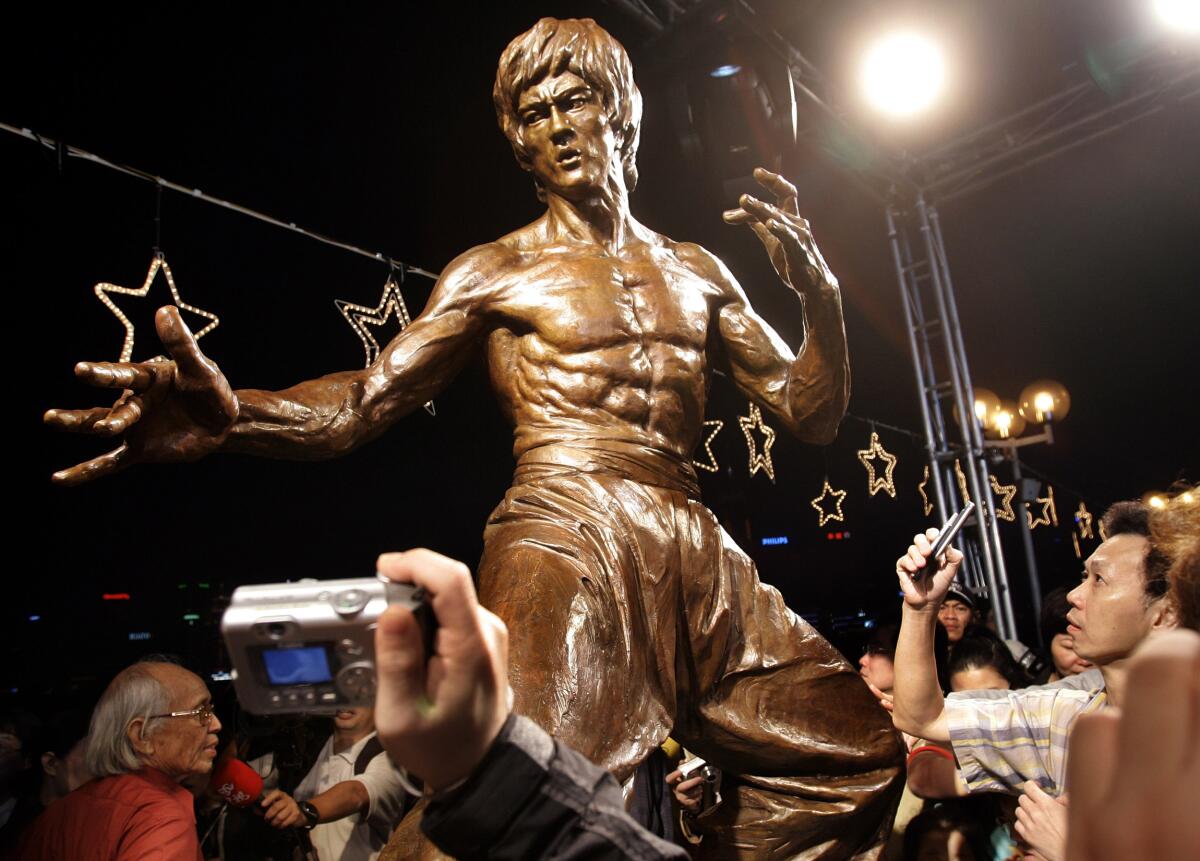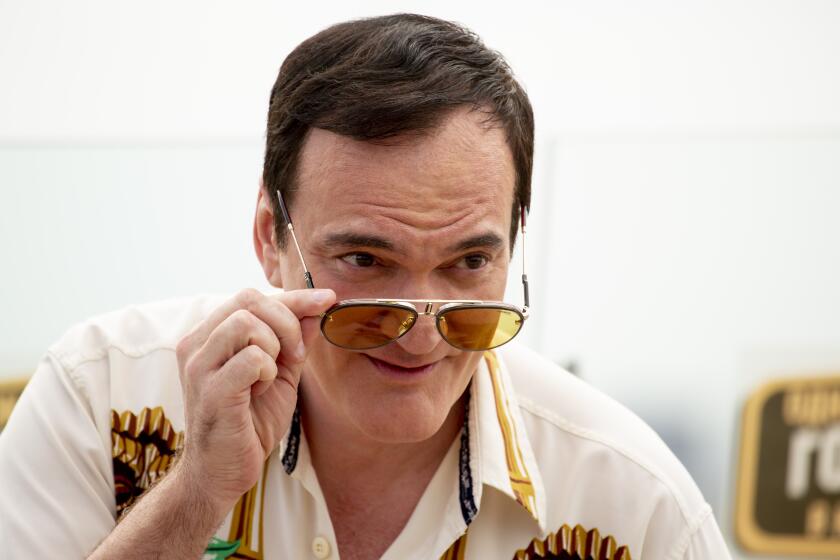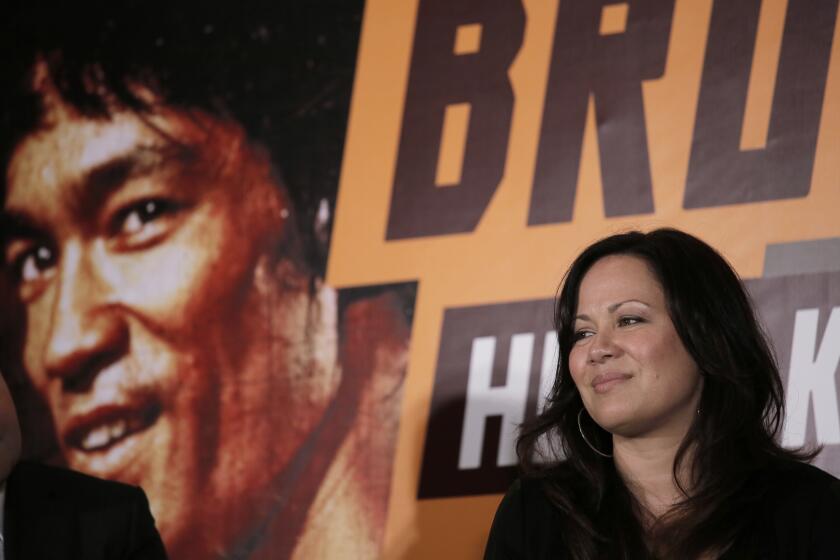Kidney specialists float a new theory after revisiting Bruce Lee’s cause of death

- Share via
Did too much water kill Bruce Lee, the martial-arts legend known for saying, “Be water, my friend”? That’s the notion put forth in a new research paper by a group of kidney specialists from Spain.
“Who killed Bruce Lee? The hyponatraemia hypothesis” is published in the December 2022 issue of Clinical Kidney Journal.
“Lee died at the age of 32 in Hong Kong on 20 July 1973, under mysterious circumstances,” the paper states, leaning into the mythology around the actor’s death. “Up to now, the cause of Bruce Lee’s death is unknown, although numerous hypotheses have been put forward, from assassination by triad gangsters to the more recent suggestion in 2018 that he died from heatstroke.”
The kidney specialists’ research is based on public documents, books and other clinical research.
How facing down Hollywood racism made Bruce Lee stronger.
A manager for Shannon Lee, Bruce Lee’s daughter, did not respond immediately Monday to The Times’ request for comment on the paper and its conclusion.
On the day of Lee’s death, the paper says, he and producer Raymond Chow drove to the house of Betty Ting Pei, where Lee spent “some hours alone” with Pei and used marijuana. Lee acted out some scenes from an upcoming movie and then, after drinking some water around 7:30 p.m., experienced headache and dizziness.
Pei gave Lee an Equagesic pill and Lee went to a bedroom to rest, the paper says. Equagesic is a combination of aspirin and meprobamate. Meprobamate is an anti-anxiety medicine marketed under the brand names Miltown and Equanil.
Two hours later, Pei found Lee unconscious, according to the paper. A doctor who was summoned tried CPR unsuccessfully, and Lee was sent to a nearby hospital where he was pronounced dead.
I was personally offended by Alison Dakota Gee’s article about my late husband, Bruce Lee (“Dragon Days,” Calendar, July 20).
(Incidentally, a July 1973 report in The Times said Pei initially categorically denied Lee was found at her apartment, while sources at the ambulance company swore they had picked up the actor at her place. Time appears to have resolved that disconnect.)
Lee’s death was officially ruled the result of cerebral edema — swelling of the brain. While a normal human brain is about 3 pounds, Lee’s was reportedly closer to 3½ pounds.
The paper’s authors offer their theory about what caused the swelling.
“[W]e hypothesize that Bruce Lee died from a specific form of kidney dysfunction: the inability to excrete enough water to maintain water homeostasis.... This may lead to hyponatraemia, cerebral oedema and death within hours if excess water intake is not matched by water excretion in urine, which is in line with the timeline of Lee’s demise.”
At a press event in Russia, Quentin Tarantino defended his controversial portrayal of the late Bruce Lee in “Once Upon a Time ... in Hollywood.”
Hyponatremia is a below-normal concentration of the electrolyte sodium in the blood. The authors note that Lee did not appear to have consumed enough water that day (six to eight liters) to trigger hyponatremia in a normal person, but cited evidence gleaned from various books and publications to suggest he was predisposed to the condition based on certain behaviors.
In other words, the paper said, Lee had done a lot of things that messed with the normal water-balancing mechanisms in his body, including high chronic water intake and going on a juice diet. That set him up to be more sensitive to hyponatremia, in which the body holds on to too much water, causing symptoms including nausea, headache, cramping, confusion, fatigue, seizures and in severe cases coma from rapid brain swelling, which can result in death.
“The fact that we are 60% ... water does not protect us from the potentially lethal consequences of drinking water at a faster rate than our kidneys can excrete excess water,” the paper’s authors conclude. “Ironically, Lee made famous the quote ‘Be water my friend,’ but excess water appears to have ultimately killed him.”
Lee’s cause of death has long been a source of speculation and point of contention, given the mythology that has grown around the much-loved martial-arts star.
Shannon Lee, daughter of the late Chinese American martial arts icon Bruce Lee, is tired of people like “Once Upon a Time ... in Hollywood” director Quentin Tarantino “mansplaining” her father to her.
A 1998 Los Angeles Times story marking the 25th anniversary of Lee’s death brought a strong written rebuttal from his widow, Linda Lee Cadwell.
The story went a bit further than the autopsy had, stating, “The date was July 20, 1973. The cause of death: cerebral edema, a swelling of the brain brought on after Lee had taken too much aspirin.”
It also mentioned that toward the end of his life, Lee had suffered “several public blows” to his heroic image.
“For one thing, he had developed a serious cannabis addiction,” the story stated. “For another, he was having an extramarital affair. (Although Lee was wed to his American college sweetheart, Linda Emery, who raised his two children, Brandon and Shannon, he died in the bed of Taiwanese actress Betty Ting Pei.)”
Enough already from Quentin Tarantino, Bruce Lee’s daughter says, after the “Once Upon a Time ... in Hollywood” director holds his ground on Lee’s portrayal.
Cadwell, in her letter to The Times, said the story “sank to the depths of tabloid journalism in sensationalizing the life and death of an extraordinarily gifted human being.”
She decried the writer’s assumption that Lee used a lot of weed and stuck with Lee’s official cause of death.
“Without going into every detail, let me rebut for those who wish to know the truth: Bruce died from cerebral edema caused by hypersensitivity to an ingredient in a prescription medication called Equagesic,” Cadwell wrote. “This determination was made after an exhaustive, nine-day coroner’s inquest during which the testimony of forensic pathologists from all over the world, who had studied every tissue in Bruce’s body, was heard.”
She also took issue with the notion that Lee was having an affair. The authors of the new paper say only that Pei “was thought to be” Lee’s mistress.
Dan Inosanto takes issue with Bruce Lee’s arrogant depiction in Quentin Tarantino’s “Once Upon a Time ... in Hollywood,” adding to the growing list of critics.
“Your reporter ... jumps to the hasty conclusion that because Bruce lay down with a headache at the home of an actress, and subsequently died from the prescription medication she gave him, he was therefore having an extramarital affair. These types of statements, reported as fact, are purely speculative hearsay, the product of a 25-year rumor mill kept alive by the gossip of people who were never there, including your reporter and others quoted in the article,” Cadwell wrote in her scathing missive.
“I have seen and heard every juicy bit of malicious rumor about the life and death of Bruce Lee over the years. But I could not stand by and let this newspaper that used to have standards of integrity and decency stoop to the level of journalistic trash talk.”
Lee was not a perfect person, Cadwell said, “only one that did more good than harm in his short time on this Earth. He faced many obstacles in his life — overcoming racist attitudes, surviving dire economic circumstances, surmounting physical injuries — and in so doing distinguished himself as someone to be rightfully admired and emulated.”
If the new paper is on target, however, that emulation should stop shy of excessive fluid intake.
More to Read
The biggest entertainment stories
Get our big stories about Hollywood, film, television, music, arts, culture and more right in your inbox as soon as they publish.
You may occasionally receive promotional content from the Los Angeles Times.













